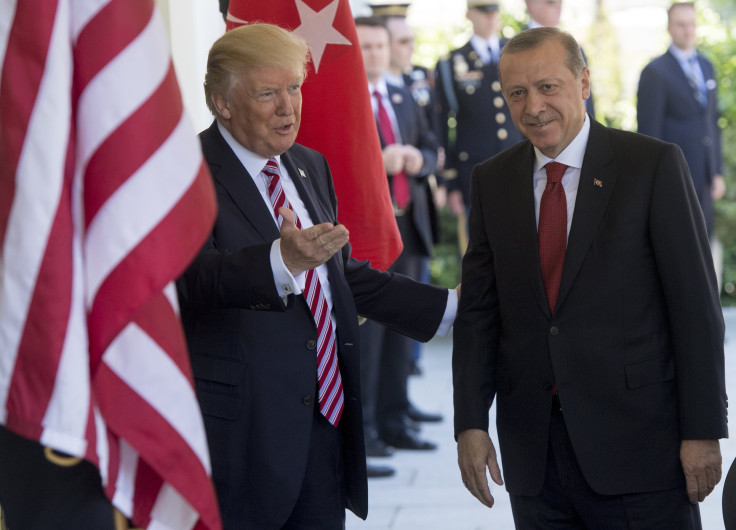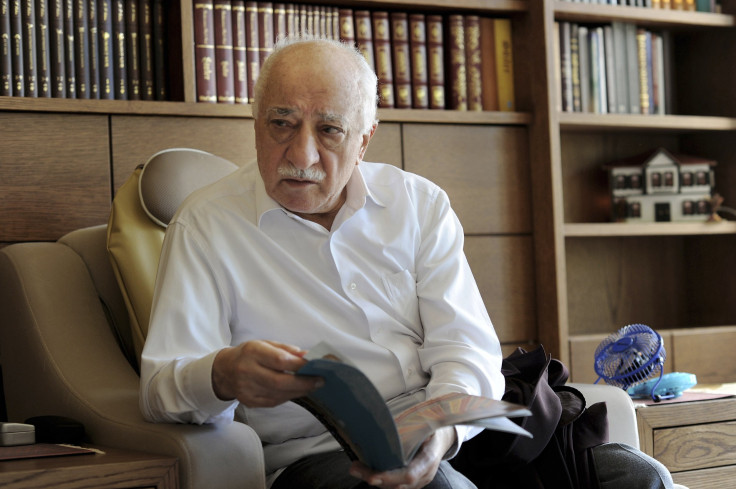Turkey's US Lobbyists Want States To Examine Alleged Fraud At Exiled Cleric's Charter Schools

Turkish President Recep Tayyip Erdoğan has long asked the U.S. to hand over exiled opposition figure and Pennsylvania resident Fetullah Gulen to face trial in Turkey, but the U.S. government has refused Erdoğan's requests. Now, an American lobbying firm hired by Erdoğan’s administration is pressuring state officials to investigate Gulen and his network of charter schools for allegedly defrauding U.S. taxpayers hundreds of millions of dollars.
Last week, the law firm Amsterdam & Partners sent emails to state officials, including a governor, attorneys general and speakers of the house, representing 25 states and the District of Columbia. The emails asked for meetings to discuss Gulen-affiliated charter schools operating in their states. The emails also plugged the firm’s 650-page 2017 report on the schools, titled “Empire of Deceit: An Investigation of the Gülen Charter School Network.” In the emails, the firm charged that Gulen “surreptitiously oversees a nationwide network of nearly 200 charter schools” that has misused at least $243 million in taxpayer funds, obtained 6,500 H-1B visas it has used to import unqualified Turkish teachers, and manipulated “state mandated testing, grades and attendance figures.”
The leader of an eponymous international movement based on a moderate interpretation of Islam, Gulen was once an ally of Erdoğan, a democratically elected leader who has been widely criticized for jailing thousands of journalists, academics and civil servants.
But the two men are now bitter enemies. Erdoğan has said Gulen was the mastermind behind a failed 2016 coup that sought to overthrow the Turkish government (Gulen has denied involvement), and the increasingly autocratic Turkish leader said earlier this month that Turkey would not extradite any terror suspects to the U.S. until Gulen is extradited to Turkey, where his network is considered a terrorist organization, a view not shared by the U.S. or the European Union. While the movement, dubbed “Hizmet” (Turkish for “the service”), may not be engaged in terrorism, the FBI is investigating whether Gulen-affiliated charter schools were being used to generate funding for Gulen’s movement in Turkey, according to a 2017 CBS News report. In 2011, the New York Times reported that two Gulen charter schools gave $50 million to Gulen-connected contractors.

The emails, which were filed with the Justice Department under the Foreign Agents Registration Act (FARA), were written by attorney John C. Martin and seemed to be form letters with details changed to reflect differences between the states.
“I wanted to reach out to you regarding recent troubling discoveries in [state] charter schools,” the emails said. “In [state], there are a network of charter schools where there have been serious allegations of, or highly suspected activities of financial mismanagement, suspected fraud, apparent self-dealing, discrimination and unusual immigration/visa practices.”
The emails concluded with a request for a meeting. “Would you be available for a call and/or in person meeting to discuss this pressing issue further?” Martin asked.
Turkey hired Amsterdam & Partners to investigate the Gulen charter school network in 2015, the year before the attempted coup.
“The activities of the Gulen network, including its penetration of the Turkish judiciary and police, as well as its political lobbying abroad, should concern everyone who cares about the future of democracy in Turkey,” Robert Amsterdam, the firm’s founder, said during an October 2015 press conference announcing the partnership between his firm and the Turkish government. Amsterdam has also represented exiled Russian oligarch and Kremlin critic Mikhail Khodorkovsky, Singaporean opposition figure Dr. Chee Soon Juan and internet activist and entrepreneur Kim Dotcom.
Amsterdam & Partners has hired at least five outside firms to help represent the Turkish government and raise awareness about the Gulen network, FARA filings show.
Turkish-American relations have been strained in recent months. In August, a U.S. grand jury indicted 19 members of Erdoğan's security detail for attacking protesters during the president’s May 2017 visit to Washington, D.C. Last last year, a diplomatic row resulted in U.S. and Turkey refusing to issue visas to citizens from the other country for three months (the standoff ended in December). On Sunday, Turkish troops crossed the border into Syria to advance on Kurdish militia backed by the U.S.
© Copyright IBTimes 2024. All rights reserved.






















